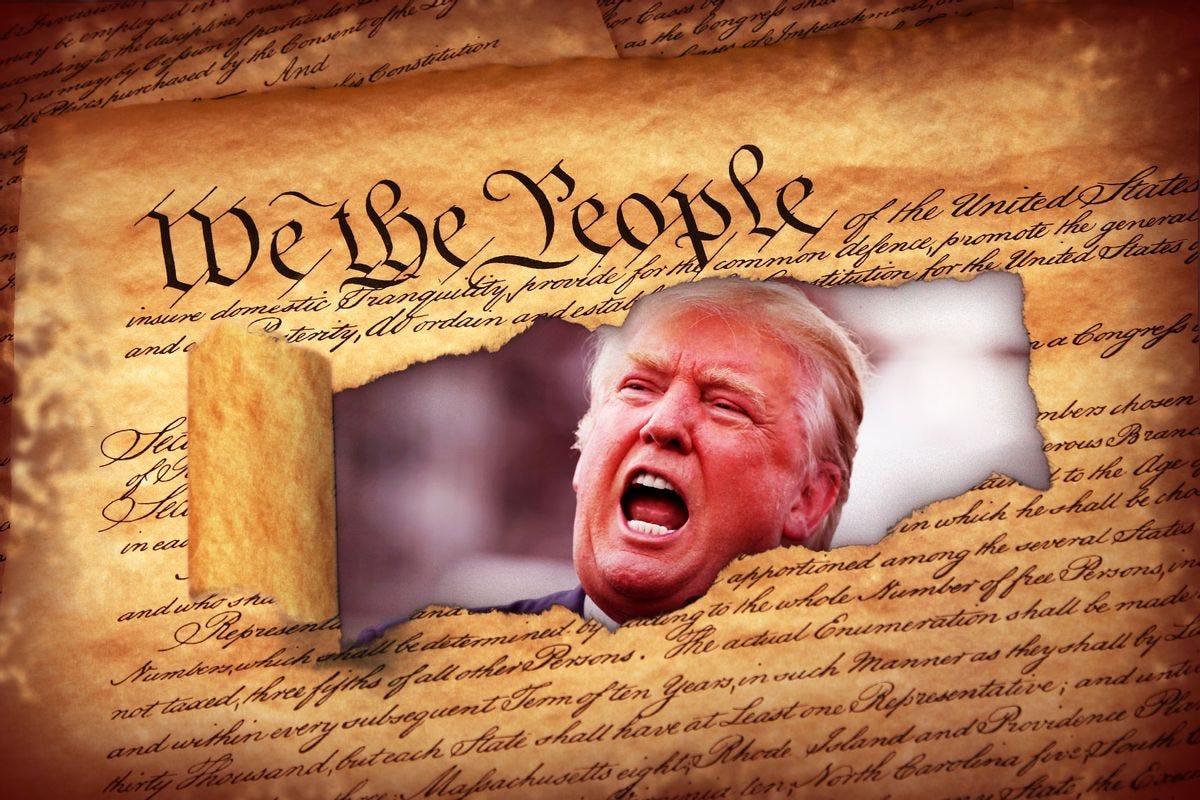Would the Constitution even apply to Donald Trump if he is elected president?
According to "his" Supreme Court, probably not
Donald J. Trump infamously called for the termination of the Constitution when he was seeking to be declared the “RIGHTFUL WINNER” of the 2020 election in December of that year.
“A Massive Fraud of this type and magnitude allows for the termination of all rules, regulations, and articles, even those found in the Constitution,” he wrote on his social media platform, Truth Social.
If Trump wins the election next month, that wouldn’t even be necessary, because the six Republican-appointed members of the Supreme Court did that for him on July 1 of this year when they decided his petition seeking immunity from prosecution in his favor in Trump v. United States.
Legal experts writing on that blasphemous decision have concentrated on the court’s distinction between a president’s “official” and “unofficial” acts. When the court found that “the President may not be prosecuted for exercising his core constitutional powers, and he is entitled to at least presumptive immunity from prosecution for his official acts,” it also found that “The president enjoys no immunity for his unofficial acts.”
Wow, thank you for that, Justices Roberts, Alito, Thomas, Kavanaugh, Gorsuch and Barrett. Since the Constitution itself is utterly silent on the matter of presidential immunity, it was nice of you to create it for us.
I got down into the weeds of Roberts’ decision and some of Barrett’s concurrence, and I have to tell you that only in the Olympic sport of gymnastics have I ever seen such an ability to bend over backward while bowing before power. Within the first two dozen pages, I lost count of the number of citations of previous Supreme Court decisions and decisions by lesser courts, an obvious and extensive attempt by Roberts to be taken seriously. His law clerks must have put in for disability pay after the time they spent paging through the impenetrable gibberish of former Supreme Court justices and other federal judges, none of whom, it should be noted, ever located the paragraph or sentence in the Constitution where the word “immunity” is found alongside the words “president” or “presidential.” Not a peep from all the “originalists,” incidentally, whose squawks could be heard for miles when the Supreme Court in Roe found a right to privacy in the Constitution that they pointed out, ad infinitum, was not in its text.
There is one gigantic omission in the Supreme Court’s reasoning in Trump v. United States. They somehow forgot the implications of their decision found in the fourth clause of Article II, Section 3, which states that the president “ shall take care that the laws be faithfully executed.” That is, if a president’s official acts are immune from prosecution and oversight by the Congress, which the decision also makes clear, then a president is a law unto himself. How can a man who has been given the power, in effect, to unilaterally make law also make sure that he “takes care” that any such laws are “faithfully executed,” since he is the one executing them?
This is an excerpt from my weekly Salon column. For the rest of the column, follow the link here:




Powerful! But I don't think you can jump from Dred Scott to Shelby County and Trump v U.S. without a pit stop at Citizens United. Keep it up, Lucian—
The Constitution would apply to the president with respect to the separation of powers. For example, the president could not remove Supreme Court justices he dislikes, because the Constitution allows them to be removed only by congressional impeachment. The president could, however, order the military to murder justices as an official act and not face prosecution. He’d then pardon the murderers.